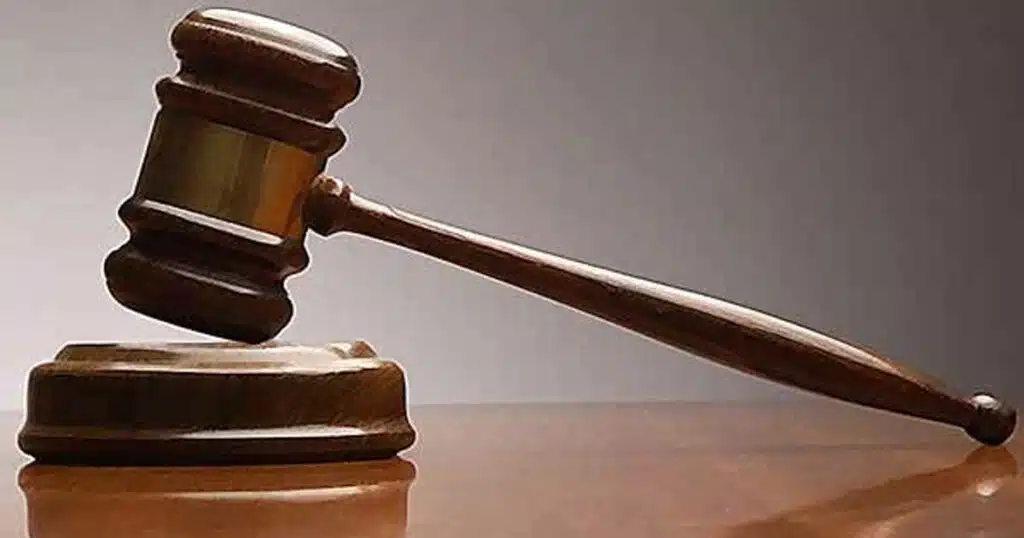
From Lawfare to Barfare: Another Way To Target Trump Allies
When Jeffrey Clark was tapped to lead the second Trump administration’s chief regulatory review office, it marked an astonishing redemption.
For years, congressional investigators and prosecutors had pursued the former Department of Justice official primarily over an unsent letter he drafted, in support of President Trump’s 2020 election challenge, calling for Georgia to consider launching a last-minute legislative session to review its results.
Trump’s return to power has not ended Clark’s troubles: Washington, D.C.’s legal disciplinary authority has recommended he be disbarred over his conduct from five years ago. Lawyers for Clark claim that the effort seeks to punish “thought crime” regarding their client’s belief in potential irregularities in an election that authorities declared devoid of widespread fraud.
Even as President Trump’s critics now claim he is engaging in retribution against a wide range of past assailants, including former FBI Director James Comey, his supporters say Clark’s case reveals there is an ongoing, politically motivated push to punish MAGA advocates. In their telling, the president’s adversaries who weaponized the justice system through “lawfare” have opened another front in their war through “barfare.”
The Rise of Barfare
Since 2020, Democratic officials and progressive groups established specifically to target conservatives have lodged bar complaints against dozens of Trump-allied attorneys such as Clark. While supporters of these efforts say they are trying to hold officeholders and advocates accountable for actions that betrayed the canons of ethical legal practice, conservative opponents say the push to punish their political foes via bar complaints, often brought in politically partisan jurisdictions, threatens not only the ability of presidents to receive counsel but the American legal system itself.
“The most politicized situations are the ones where the bar should be the most reticent,” to consider punishing attorneys over their work, James Burnham, former DOGE general counsel, said during a recent panel discussion on alleged bar weaponization hosted by the right-leaning Federalist Society. “That’s when lawyers are supposed to be the most creative and the most aggressive. But it’s not the kind of situation where we want lawyers to be afraid to even engage in advocacy in the first place.”
The Clark complaint concerned his activities in the final weeks of the first Trump administration, while he served in part as acting assistant attorney general for the Justice Department’s Civil Division. Clark, an environmental and regulatory lawyer by background, believed that there was potentially election-altering fraud or irregularities in Georgia and other states, requiring resolution before the fast-approaching January 6, 2021, election certification date.
In response, he wrote a draft letter dated Dec. 28 and addressed to Georgia leaders recommending that the state legislature convene a special session to further probe potential irregularities and take remedial steps as necessary if they impacted the election outcome.
Clark circulated the letter to acting Attorney General Jeffrey Rosen and Deputy Attorney General Richard Donoghue, who were responsible for probing 2020 election issues. Rosen and Donoghue disagreed with its thrust – especially the suggestion that there was potentially election-altering fraud – and declined to sign and deliver it.
Trump Gets Wind
As Trump’s election challenge proceeded, he got wind of Clark’s views. Apparently finding an ally, the president floated the idea of making Clark acting attorney general. Clark allegedly offered to decline any such appointment if Rosen would sign off on the letter, the then-Democrat-led Senate Judiciary Committee would later report – an allegation Clark would flatly deny. In opposition to a possible appointment, Clark’s superiors convened a Jan. 3, 2021, meeting with President Trump and other officials, at which several said they and other colleagues would resign en masse should the president elevate him.
Ultimately, the president backed off, and Clark’s letter was consigned to the ashbin of history – until one or several ex-Trump administration officials leaked word of its existence and contents to the New York Times. The Times wrote about Clark’s efforts in a Jan. 22 article titled “Trump and Justice Dept. Lawyer Said to Have Plotted to Oust Acting Attorney General.”
A flurry of probes pertaining to the president’s election challenge would follow. Clark – a Harvard- and Georgetown-educated litigator who had spent the bulk of his career as a partner at white-shoe law firm Kirland & Ellis – would spend the next several years facing the scrutiny of congressional committees, including the Democrat-dominated January 6 Committee, and prosecution in cases brought by Fani Willis in Fulton County, Georgia, and Special Counsel Jack Smith in Washington, D.C. In June 2022, he was forced to wait outside his home in his undergarments while federal investigators searched his suburban Virginia residence, seizing electronic devices in connection with their January 6 probe.
In July 2022, in response to a complaint lodged by the then-Democrat-led Senate, the D.C. Board on Professional Responsibility charged Clark with violating the D.C. Rules of Professional Conduct. It accused him of engaging “in conduct involving dishonesty” by drafting the letter the board alleged contained false statements, and for “attempt[ing] to engage in conduct that would seriously interfere with the administration of justice.”
The allegations against Clark rested in part on the argument that because his superiors disagreed with his views on potential election fraud in Georgia, Clark’s assertions in the letter were fraudulent.
Unprecedented Case
In his defense, Clark invoked a slew of privileges, and raised myriad procedural and substantive arguments – including that the local D.C. disciplinary board lacked jurisdiction over Clark’s conduct as a federal lawyer providing counsel to the president; that Clark enjoyed immunity from liability while rendering advice to the president; and that the purported false statements were merely proposed Justice Department positions for consideration by superiors – positions largely consistent, as his lawyers noted, with those raised by several U.S. Supreme Court justices and nearly 20 state attorneys general.
Clark’s lawyers argued during his trial that “[N]o one has ever been charged by the D.C. Bar with attempted dishonesty in a draft letter that recommended a change in policy or position where that document was not approved and never even left the office.”
His lawyers made the point that sanctioning him for such conduct would lead to a limitless array of disciplinary actions against attorneys over private or internal deliberations on behalf of clients should they hold contrarian views.
Government “lawyers will be afraid to give their candid opinions for fear of losing their careers. Likewise, lawyers will not join government for the same reason,” Harry MacDougald, one of Clark’s lawyers, told RealClearInvestigations.
On July 31, 2025, despite acknowledging “that there are no factually comparable prior disciplinary cases,” a majority of the board recommended that Clark be disbarred. While rejecting Clark’s arguments, including that he was protected as a government lawyer giving advice, the nine-member board said that the charges against him “focus on the truthfulness of the factual assertions” in the letter that he authored.
Although Clark’s superiors had testified that Clark had “sincere personal concerns” regarding the integrity of the election, the board said, “they also agreed that the Justice Department had not identified potentially outcome-determinative issues in Georgia or other states.”
Therefore, his continued efforts to press officials to send the letter “constituted an attempt to make intentionally false statements about the results of the Justice Department’s investigation,” the board said.
The tribunal added that Clark “should be disbarred as a consequence and to send a message to the rest of the Bar and to the public that this behavior will not be tolerated.”
The disbarment decision is pending before the D.C. Court of Appeals, which has final say over such decisions in the nation’s capital.
Claims of Unequal Justice
In an August 2025 filing with the appeals court obtained by RCI detailing Clark’s exceptions to the board’s order, his counsel contrasted the disciplinary tribunal’s treatment of the Justice Department lawyer with that of FBI lawyer Kevin Clinesmith. He received just a one-year suspension for doctoring a document submitted to the FISA Court supporting the government’s FISA warrant application that enabled them to surveil Trump adviser Carter Page.
“The disciplinary process in the D.C. bar is radically disparate according to the political affiliation and views of the respondent attorney,” Clark’s lawyers charged.
A preliminary review of public records indicates that a majority of the board that made the Clark recommendation was comprised of registered Democrats, individuals who had contributed to Democrat candidates, or public advocates of progressive causes. Only one board member was publicly identifiable as a Republican.
The board recommendation followed a trial before a separate three-member panel, at least two of whom were registered Democrats and had contributed financially to Democratic Party candidates, public records show.
The Office of Disciplinary Counsel, which handed down the original charges against Clark and effectively prosecutes such cases, is also headed by an attorney, Hamilton P. FoxIII, who, according to public records, is a Democrat.
“D.C. voted Democrat more than 90% against Trump all three times he was on the ballot – the most lopsided margin in the country to have its own Bar,” MacDougald noted on X in a response to the disciplinary authority’s decision.
Many prominent Republicans also took issue with the actions of Trump and his confidantes in challenging the 2020 election. This includes the sole publicly identifiable Republican board member, Margaret M. Cassidy, a member of the Republican National Lawyers Association who concurred in the recommendation that Clark be disbarred.
After the panel handed down its recommendation to disbar Clark, MacDougald told RCI, “the reason Jeff has been singled out is lawfare – straight up political persecution.”
With the Clark disbarment decision now in the hands of federal judges, the lawyer may have just gotten a big boost. On Sept. 25, three former attorneys general submitted an amicus brief in support of his case. William P. Barr, Jeff Sessions, and Michael Mukasey – all Republican-appointed prosecutors, but not all supportive of Clark’s conduct – echoed his arguments in writing:
“The District of Columbia Board on Professional Responsibility…has no business – indeed, no authority whatever – in policing internal deliberative discussions and documents exchanged within the federal Executive Branch for containing purportedly ‘dishonest’ (yet somehow also ‘sincere’) ideas or assertions,” they said.
They added that “immunity for top advisors is necessary to ensure that the President may receive candid and necessary advice prior to acting.”
“Although we are not persuaded by Mr. Clark’s proposed legal strategy, and former Attorney General Barr has publicly criticized it in no uncertain terms, disbarring or otherwise disciplining Mr. Clark for those actions would set a dangerous precedent that would significantly interfere with Executive Branch functions,” while sending a “biting chill throughout the federal government,” they concluded.
Not Alone in the Dock
On the same July day that the D.C. tribunal formally made its recommendation to disbar Clark, three current Justice Department officials were hit with ethics complaints lodged with the bar disciplinary authorities where they are licensed to practice.
The parallel complaints – targeting Deputy Assistant Attorney General Eric Hamilton, Special Counsel Brad Rosenberg, and Trial Attorney Liam Holland – allege they made “intentionally and materially misleading statements” in litigation over the Trump administration’s attempt to curtail the work of the Consumer Financial Protection Bureau. The complaints note that presiding Judge Amy Berman Jackson of the D.C. District Court upbraided the lawyers over certain representations made to the court.
Several ex-DOJ staff members have defended their colleagues, writing that “our former colleagues took immediate steps to correct the record in response to plaintiffs’ evidence,” while noting that “leaving any such inquiry in the first instance to the court and the parties, who have intimate knowledge of the facts and circumstances that state bar authorities lack, would be a far better approach for determining whether sanctionable misconduct occurred.”
The Justice Department did not respond to RCI’s inquiries regarding the complaints against its employees.
The three complaints were filed by the Legal Accountability Center. The advocacy group’s executive director, Michael J. Teter, has said its efforts are aimed at “going on offense in defense of democracy” at a time when “the rule of law is under direct assault.” The organization maintains it is merely seeking to hold to account “attorneys who abuse their power and violate professional conduct rules.” Its financials are unavailable. A broken web link appears to tie the nonprofit to progressive tech billionaire Pierre Omidyar’s Democracy Fund.
Among the Legal Accountability Center’s initiatives is The 65 Project. The so-called “dark money” outfit was launched in the wake of the 2020 election to “shame” lawyers who represented President Trump in some 65 lawsuits challenging the election and “make them toxic in their communities and their firms,” according to Democrat operative David Brock, founder of the partisan watchdog group Media Matters, who is one of the group’s advisers.
Billed as a bipartisan effort, The 65 Project is led by staffers with ties to Democratic Party campaigns and causes. Teter, who also serves as its managing director, has worked for candidates including John Kerry and counseled the liberal American Civil Liberties Union. Its senior advisor, Melissa Moss, is a former Clinton appointee and finance director of the Democratic National Committee.
The 65 Project was originally run through another nonprofit, Moss’ Law Works, which achieved notoriety for hosting a stage adaptation of the Mueller Report performed by Hollywood stars. According to archived websites, The 65 Project was sponsored by the Franklin Education Forum, a supporter of progressive causes previously chaired by Brock, and a grant recipient of Omidyar’s Democracy Fund.
Neither Teter nor the organizations with which he is affiliated responded to RCI’s inquiries in connection with this story.
Justice or Harassment?
More senior officials, as well, have gotten hit with bar complaints in recent months. In September, the center filed a bar complaint against Deputy U.S. Attorney General Todd Blanche, claiming, among other things, a conflict of interest in his interviewing of Ghislaine Maxwell. It also filed a complaint against Ed Martin, the former U.S. attorney for D.C., asserting he had abused his position and conduct rules by engaging in politically motivated investigations, among other matters. Martin, now a DOJ special attorney, also faces scrutiny from the D.C. disciplinary body. During his tenure as U.S. attorney, he had requested information of that office, citing in part the Clark case, indicating his concern that it might be biased against conservatives.
Elected Republican officials around the country, including Montana Attorney General Austin Knudsen, and Lawrence VanDyke, the former solicitor general in Montana and Nevada, and a current judge on the Ninth Circuit Court of Appeals, have also been targeted.
Judging by their disposition, most of these accusations were of dubious legal merit. A recent analysis of nearly 80 complaints filed by third-party organizations like The 65 Project against attorneys who represented Trump or related causes – many of them Republican state attorneys general – found that in only three instances did attorneys face public discipline.
The conservative group America First Legal filed a bar complaint against Teter last fall for his The 65 Project work, claiming he was abusing the bar disciplinary process in targeting attorneys associated with Trump. It is unclear whether the Utah Bar, which received the complaint, has taken any action.
De-Weaponizing the Bar Discipline Process
Those who believe the bar is being weaponized against those who hold disfavored viewpoints – namely on the right – say corrective action is required. They assert that, beyond pursuing arguments regarding the immunity that federal lawyers ought to have from state and local authorities, there is a First Amendment right to viewpoint diversity that quasi-governmental entities, such as state bar associations, are currently violating.
Some, such as Michael Francisco, an appellate litigator who formerly clerked for Supreme Court Justice Neil Gorsuch, believe that “attorneys are not capable of regulating themselves.”
America First Legal’s Gene Hamilton echoed these remarks, adding during the Federalist Society panel: “I really do think that each of the state bar associations need to take a really hard look at the rules and to modify them to prevent abuses of the disciplinary process.”
Clark’s lawyer, MacDougald, told RCI that ultimately, lawyers advocating for Republican and Democratic causes will be losers if the weaponization of discipline doesn’t end.
“Lawyers have a job to do and should be allowed to do it,” he said. “State legislatures and State Bar associations must reform themselves and commit to political neutrality or they will destroy themselves and the profession.”
This article was originally published by RealClearInvestigations and made available via RealClearWire.



